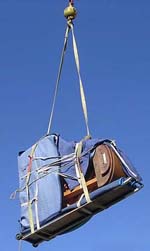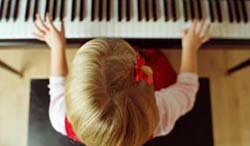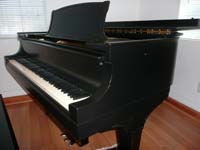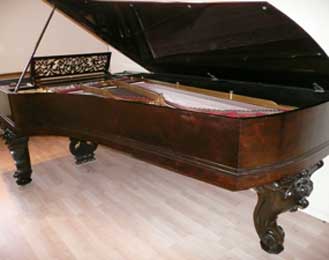Welcome to LivingPianos.com, I’m Robert Estrin. Today I’m going to tell you about five misleading piano terms. You may have heard some of these terms and wondered what they mean. They may sound scary and you want to know more about them. Let’s dive right in!
The first term we are going to discuss is “Gray Market Pianos”.
When you hear this term, it sounds pretty foreboding, almost like it is something illegal! Truth be known, gray market is a term coined by Yamaha North America. Yamaha North America is the sole distributor of Yamaha pianos on our continent. Every new Yamaha piano that is sold in North America must go through this corporation. Yamaha North America is separate from Yamaha International.
Japanese culture doesn’t like used things so much. As a result, there’s a glut of gently used Yamaha pianos in Japan that nobody wants to buy. Enterprising business people refurbish the pianos and then redistribute them in the United States as used Yamaha pianos. Naturally, Yamaha North America is not too happy about this because it cuts into their market. They do everything they can to try to squash it.
What are some of the things they say about them? There is certainly some truth to their claims! Yamaha wasn’t really an export company until the 1970’s. When you are talking about really old Yamaha pianos, you might wonder if they were made to withstand a wide range of climates. At one point, they weren’t exporting pianos much at all. So, this could be an issue with extremely old Yamaha pianos.
Yamaha talks about the “climatization” of their pianos for the North American environment. Here in Orange County we are about ten miles from the beach. The beach is about ten degrees cooler and probably has about 20% higher humidity than what we have here. That is just ten miles away! Go an hour and a half inland and you could be in the hot desert or cool mountains. There are many climates right around us!
What about the whole North American climate? It is kind of funny to say that pianos are climatized for North America because the climates are so diverse. Any late model Yamaha, from the 1970s and beyond, are made to handle climates all around the world.
What is another problem with buying gray market Yamahas? If a technician is ordering parts for a Yamaha piano and they provide the serial number to Yamaha and it doesn’t match one they sold, they won’t sell the parts. Is that a big problem? Not necessarily. There could be other serial numbers that could be referenced in order to get the parts. Also, Yamaha is not the only parts manufacturer and their parts aren’t so unusual. So, there are parts available from Abel, Renner, and other companies that can be a good fit. You just need to be aware that this is what gray market is all about. Should you be concerned? Possibly, if it is an older Yamaha, but otherwise you should be in good shape.
Another similar parallel comes from Steinway. Steinway’s biggest competition you’d think would be Yamaha, Kawai, or Bösendorfer.
The biggest competition Steinway has is used Steinway.
Why? When you go to a Steinway store you see an $80,000 piano. When you look on the used market you see similar Steinways for half the price or even less. This is obviously a big concern for Steinway. They have coined a term called, “Steinwas” claiming that if you have a Steinway piano and one or more parts on the piano were not made by them, it’s no longer a Steinway piano. Is there truth to this? Yes and no. Sometimes it can be true. There is nothing more crushing than to see badly restored Steinway pianos tarnishing their good name. I applaud them for trying to keep that high standard! However, there are also stupendous rebuilders of Steinway pianos. Steinway does rebuild pianos but they can only do a limited number of rebuilds every year. For all those used Steinway that have been made for over a hundred years, there are really high-quality rebuilders out there. They may choose to use Steinway parts, and you might wonder why they would use any other parts in the restoration. To save a few bucks here and there? Not really. I can imagine there might be a few inexperienced rebuilders who think they can get away with using a cheaper part. But the extra labor it would take to make that part work can negate any savings by selecting the wrong part. The real reason why a rebuilder would use different parts is that Steinway is not a parts builder. In fact, the only parts they have on hand are for the pianos they are currently building.
On a side note, Steinway pianos manufactured in Germany have always utilized action parts manufactured by the German company Renner. Steinway recently bought Renner Corporation.
Imagine a Steinway M from the 1920s that needs a new set of hammers. An inexperienced rebuilder might just order the set from Steinway thinking it has to be right. However, the specifications of Steinway pianos vary over the years. It may or may not be the exact right weight and geometry for a specific piano from the past that you are trying to rebuild. The good news is that there are many companies that make very fine parts. Renner and Abel (to mention just two companies) make great hammers. There are a number of companies that make great piano parts.
The critical thing is using the right part for a specific piano.
Sometimes you go into a store and you wonder about a piano and the salesperson might tout a piano with an “all-spruce soundboard”. You probably think that spruce is great. In reality, “all-spruce” is a clever way of not indicating to you that the soundboard is not a solid spruce soundboard, which is the preferred board for high-quality pianos.
What is important is to have a “Solid Spruce Soundboard”.
A soundboard may be, “all-spruce” but utilizing laminated wood which is simply plywood. What is wrong with that? First, let’s talk about the benefits of laminated soundboards. A laminated board is much, much more durable just like plywood is less likely to crack than solid wood. Why is that? Because the grains are put layer upon layer crossing each other with cement between. It is almost impossible for a crack to go through because each layer of wood is positioned at 90-degree angles to one another.
A laminated soundboard is stronger than a solid spruce soundboard.
The bad news is that laminated soundboards lack the rich tone of high quality, solid spruce soundboards. The vibrations are not as rich and complex. You’re better off with a solid board unless you live in a harsh climate. If you hear the term, “all-spruce”, you now understand the implications.
Another term you’ve probably seen is the “Going Out of Business Piano Sale”.
Many of these are legitimate. When you consider that in 2005 there were over 1,200 piano stores in the United States, and today there are only around 150, you can see that many stores have actually gone out of business. However, this is the way it generally works. A store can’t keep running with depleting inventory and have enough money to cover operating expenses. When they get down to two pianos, how could that possibly work? It can’t. Usually, a going out of business sale entails partnering with another store that feeds additional inventory so their store can function as they sell out their inventory. There is a lot of hype that goes into these sales and sometimes they are very successful with tremendous amounts of promotion. It is not necessarily a bad place to buy a piano. But you should be aware that the sale may not be as desperate a situation as it appears to be. Worse yet, sometimes you see people taking advantage of these situations. A store might do a going out of business sale for months or even years! Sometimes they will even change names and do it all again. I’ve seen it happen and it gives a bad name to the whole piano industry.
Lastly, and related to this, are the famous college piano sales.
You’ll see these all the time. You might wonder how they have so many used pianos to sell. You might remember a similar sale just last year. Here’s how it works. College piano sales are a partnership among a manufacturer, a store, a distributor, and a finance company. They go to a school and offer to put several free pianos in the school for a year in exchange for a sale the following year that is promoted to the entire mailing list of the college or university. It can make for a very potent event.
The vast majority of the pianos at college sales do not usually belong to the college.
This is actually a good thing! If you’ve ever seen what school pianos look like, they are usually thrashed! Because they get used so much, the cases get beaten up and the pianos can be worn out. Indeed, the pianos at college sales have been there for just a year, usually kept in studios, not in practice rooms. These are the college pianos that are sold at these events. That just might be a handful of pianos. Yet, you have a whole school full of dozens of pianos that come from a store who is trying to capitalize on the event by selling a wide range of inventory to the staff, students, and alumni of the school. Is it a good place to buy a piano? Possibly. If you know exactly what you want and you don’t want to go through the negotiation process, it is a fine fit. However, it is definitely not the place to go if you want to try out pianos and have any kind of relaxed way of exploring different instruments for yourself. It is a high pressure, quick, know what you want, here is the price, and buy it situation. While it is not completely deceptive, you should understand what it is. It is mostly a good situation since you are not buying abused college pianos.
Those are five things that are not what they appear to be. I hope this has been helpful for you. If any of you are piano shopping or have piano questions, LivingPianos.com is always here as a resource for you. Thank you so much for joining me, Robert Estrin here at LivingPianos.com, Your Online Piano Store.
949-244-3729
info@LivingPianos.com



























